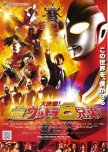Open your eyes to the unbelievable
The Multiverse of Madness we deserved. The way this movie is so unapologetic in its portrayal of hope out of hopelessness from its cast of characters is simply beautiful, I can't help but love it unconditionally.
On July 17, 1966, best friends Daigo Madoka, Shin Asuka, and Gamu Takayama watch the first broadcast Ultraman television series at Daigo's house. They are inspired to grow up and do great things. 30 years later, the three have forgotten their childhood passion for Ultraman and dreams while continuing their lives as normal civilians. With aliens threatening the utter annihilation of Earth and Daigo experiencing mysterious visions, Ultraman may just provide the key to saving the entirety of mankind.
It does feel odd that despite Ultraman Mebius and Mirai Hibino being the then-current Ultra brother and host on TV at the time, the film instead opts to tell the events from the point of view of Daigo Madoka, the human host for Ultraman Tiga. I'm not complaining mind you. It's great to see what is currently Hiroshi Nagano's final appearance in the franchise and he does so with true style and an unshakeable charm. The first four Ultraman protagonists return in maturer mentor roles yet still get to do the job they started all those years ago, seriously Susumu Kurobe, Kohji Moritsugu, Jiro Dan and Keiji Takamine are all excellent in and out of the suits. It's just a treat for the long-time fans and a beautiful cap-off for the TDG trio.
This was until recently the highest-grossing entry of the entire Ultra franchise, being overtaken by Shin Ultraman very quickly. You can see why this film made the money it did, combining a love for both the Showa and Heisei eras and showcasing the best of both worlds. I have to hand it to director Takeshi Yagi, a Heisei Ultra veteran, for crafting this film in such an exquisite way, the direction, compositing and set pieces are all top-notch and cleanly executed to the highest standards, the CGI work especially which is usually a low point for these productions looks divine. The suitmation work is just consistently beautiful but the final act is where it all comes together seeing all of the Ultra brothers fighting side by side onscreen with some seriously tense emotional stakes just hits the nail on the head.
I take my hat off most of all to writer Keiichi Hasegawa, whose name I'm more than familiar with; penning the likes of GMK, the first two Heisei Gamera films, SSSS.Gridman and numerous episodes of other Ultra shows, including my beloved Tiga. What he has crafted here however is perhaps one of his finest works. The dialogue oozes charm and sophistication in a way that only Tokusatsu can deliver, the right balance of cheesy and serious, hope and cynicism, nostalgic connections and undying charm. There wasn't a moment that went by where I didn't have a smile on my face, it's the type of fan service and nostalgia done right, not for the sake of it being there but for delivering a movie that utilises them to great effect and analyses why we have such affection for them.
The movie deconstructs the character's admiration for the ideal of hope rooted in their consumption of fantasy entertainment. How the nostalgia we have for the content we consume at a younger age has the ability to inspire us and hold us back when we are older. How our perception of the world is warped by the fantasy we desire in the world. The fantasy that we continue to search for in the world to help guide us. Doing so causes one to forget about the lessons of consistency through perseverance as a means of remembrance. Remembering what inspired an individual to develop their current meaningful connections.
The music by Toshihiko Sahashi fits the tone of the movie perfectly. Another veteran of the franchise but not without his other merits, composing for Toei's Kamen Rider series as well as the Gundam franchise. His style of composition is richly symphonic and classical with the occasional use of jazz, it plays off older themes of the series but restrains using them in their entirety outright. Sort of like how Bill Conti composed the music for For Your Eyes Only in a way. The keyboard-heavy symphonic score just fits so well with the sense of hope this movie brings.
42 years' worth of world-building leads to one of the most heartfelt love letters to a series you could ever ask for. Even for a relative Ultra series novice like myself, you can really feel the love and passion for this series throughout the movie, never relenting and never giving up its hope for the future. Old friends and foes get new and fresh redesigns that give the kaiju a huge air of menace, with the old Ultramen having never looked so good.
Overall, Great Decisive Battle! The Super 8 Ultra Brothers is a full love letter to the series that encapsulates what Ultraman represents as a whole. It reinforces the power of faith and dreams in a way that's totally unlike any film I've seen in a while. I love it to pieces.
On July 17, 1966, best friends Daigo Madoka, Shin Asuka, and Gamu Takayama watch the first broadcast Ultraman television series at Daigo's house. They are inspired to grow up and do great things. 30 years later, the three have forgotten their childhood passion for Ultraman and dreams while continuing their lives as normal civilians. With aliens threatening the utter annihilation of Earth and Daigo experiencing mysterious visions, Ultraman may just provide the key to saving the entirety of mankind.
It does feel odd that despite Ultraman Mebius and Mirai Hibino being the then-current Ultra brother and host on TV at the time, the film instead opts to tell the events from the point of view of Daigo Madoka, the human host for Ultraman Tiga. I'm not complaining mind you. It's great to see what is currently Hiroshi Nagano's final appearance in the franchise and he does so with true style and an unshakeable charm. The first four Ultraman protagonists return in maturer mentor roles yet still get to do the job they started all those years ago, seriously Susumu Kurobe, Kohji Moritsugu, Jiro Dan and Keiji Takamine are all excellent in and out of the suits. It's just a treat for the long-time fans and a beautiful cap-off for the TDG trio.
This was until recently the highest-grossing entry of the entire Ultra franchise, being overtaken by Shin Ultraman very quickly. You can see why this film made the money it did, combining a love for both the Showa and Heisei eras and showcasing the best of both worlds. I have to hand it to director Takeshi Yagi, a Heisei Ultra veteran, for crafting this film in such an exquisite way, the direction, compositing and set pieces are all top-notch and cleanly executed to the highest standards, the CGI work especially which is usually a low point for these productions looks divine. The suitmation work is just consistently beautiful but the final act is where it all comes together seeing all of the Ultra brothers fighting side by side onscreen with some seriously tense emotional stakes just hits the nail on the head.
I take my hat off most of all to writer Keiichi Hasegawa, whose name I'm more than familiar with; penning the likes of GMK, the first two Heisei Gamera films, SSSS.Gridman and numerous episodes of other Ultra shows, including my beloved Tiga. What he has crafted here however is perhaps one of his finest works. The dialogue oozes charm and sophistication in a way that only Tokusatsu can deliver, the right balance of cheesy and serious, hope and cynicism, nostalgic connections and undying charm. There wasn't a moment that went by where I didn't have a smile on my face, it's the type of fan service and nostalgia done right, not for the sake of it being there but for delivering a movie that utilises them to great effect and analyses why we have such affection for them.
The movie deconstructs the character's admiration for the ideal of hope rooted in their consumption of fantasy entertainment. How the nostalgia we have for the content we consume at a younger age has the ability to inspire us and hold us back when we are older. How our perception of the world is warped by the fantasy we desire in the world. The fantasy that we continue to search for in the world to help guide us. Doing so causes one to forget about the lessons of consistency through perseverance as a means of remembrance. Remembering what inspired an individual to develop their current meaningful connections.
The music by Toshihiko Sahashi fits the tone of the movie perfectly. Another veteran of the franchise but not without his other merits, composing for Toei's Kamen Rider series as well as the Gundam franchise. His style of composition is richly symphonic and classical with the occasional use of jazz, it plays off older themes of the series but restrains using them in their entirety outright. Sort of like how Bill Conti composed the music for For Your Eyes Only in a way. The keyboard-heavy symphonic score just fits so well with the sense of hope this movie brings.
42 years' worth of world-building leads to one of the most heartfelt love letters to a series you could ever ask for. Even for a relative Ultra series novice like myself, you can really feel the love and passion for this series throughout the movie, never relenting and never giving up its hope for the future. Old friends and foes get new and fresh redesigns that give the kaiju a huge air of menace, with the old Ultramen having never looked so good.
Overall, Great Decisive Battle! The Super 8 Ultra Brothers is a full love letter to the series that encapsulates what Ultraman represents as a whole. It reinforces the power of faith and dreams in a way that's totally unlike any film I've seen in a while. I love it to pieces.
Was this review helpful to you?






